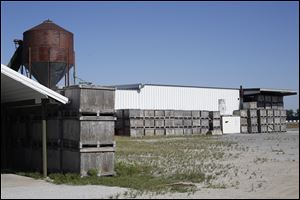
Big tomato grower shuts down this year
Area operator cites inability to get enough migrant workers
6/20/2013
The packaging barn for Charles Jones Produce, LLC lies empty near unplanted fields outside Oak Harbor. The immigrant workers who usually staff the farm were hard to find as a result of tightening immigration regulation in the United States.
OAK HARBOR, Ohio -- Northwest Ohio’s largest fresh-market tomato producer is shutting operations this summer, a move that will cost him millions of dollars, because he can’t attract enough migrant workers to pick his crops.
Charles Jones, 70, owner of Charles Jones Produce LLC in Oak Harbor recently informed the Toledo-founded Farm Labor Organizing Committee of his decision, union President Baldemar Velasquez said.
The farm labor organization represents 500 farm workers who are usually employed by the tomato grower.
Mr. Jones, who is in South Carolina, where he owns other agricultural operations, did not return phone calls for comment.
The grower's dilemma is not unique. Other fruit and vegetable growers across America have also decided to shut down their operations this summer, said Chuck Conner, president and CEO of the National Council of Farmer Cooperatives. These crop losses could cost farmers and the American public hundreds of millions of dollars and force the United States to import more food and vegetables, he said.
"Seventy percent of the agricultural work force, including the milk industry, is performed by an undocumented work force,” Mr. Conner said. “It’s a problem. Our work force is at risk.”
Mr. Conner, whose organization is in Washington, was in Toledo on Monday to lobby local and state officials to support proposed immigration-reform legislation.
That legislation includes a proposal to provide legal working status for immigrants who aren’t in the country legally. He also spoke to The Blade’s editorial board on Tuesday.
Mr. Velasquez said he wasn’t surprised by Mr. Jones’ decision. In recent years many farm workers and even Latinos who aren’t farm workers in northwest Ohio have expressed concerns about being racially profiled and frequently harassed by immigration border patrol agents and some local law enforcement officers, who don’t have authority to enforce federal immigration laws, but try to, he said.
“There’s a big chill over northern Ohio,” Mr. Velasquez said. “Nobody wants to be harassed or having to constantly be looking over their shoulder.”
Mr. Velasquez, who worked with Mr. Conner on the agricultural portion of the proposal, said immigration reform could alleviate a lot of problems for farmers and immigrants. “Immigration reform is having an immediate impact on northwest Ohio now,” Mr. Velasquez said. “Our immigration system has been broken for a long time.
“The significance of what’s happened in Oak Harbor needs to be understood; it’s affecting more than just the Latino population."
Those 500 migrant farm workers usually employed by Charles Jones earn a combined annual payroll of about $2.6 million, Mr. Velasquez said. A significant portion of that income is spent locally on food, clothing, gas, and big ticket items like new vehicles. Restaurants, grocery stores, laundry facilities, gas stations will all lose business, he said.
Growers annually spend hundreds of thousands of dollars on seeds and other materials and products, which generates income for businesses and sales income tax, revenue that will be missing this year, Mr. Velasquez said.
Many northwest Ohio restaurants and grocery stores have contracts to purchase tomatoes from Mr. Jones, Mr. Velasquez said. That means these businesses will have to have their tomatoes trucked in from other states instead of grown in Ohio this year, he said.
“This will be a significant hit to the local economy, particularly, Oak Harbor, Fremont, and Woodville,” Mr. Velasquez said. “It’s not just the grower and farm workers who feel the repercussions.”
Mr. Velasquez said he did not know specifically how much money Mr. Jones would lose from not growing tomatoes this year. He would also not estimate the possible financial impact to the local economy.
Justin Darisse, vice president of communications for the National Council of Farmer Cooperatives, said as a rule-of-thumb, the presence of each farm worker supports two to three additional jobs in a community.
The U.S. Senate is debating an immigration reform bill that would allow growers to hire more guest workers — 122,000 per year for the next three years and up to 337,000 by 2020.
It also would put hundreds of thousands of migrant farm workers on a faster path toward U.S. citizenship and receive stronger labor protections.
Contact Federico Martinez at: fmartinez@theblade.com or 419-724-6154